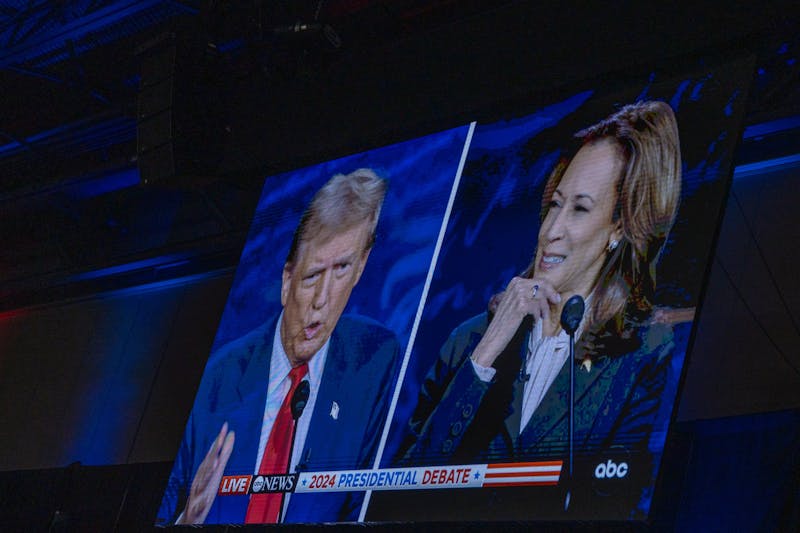
“If you vote for Donald Trump, you’re racist, you’re sexist, you’re deplorable.”
“If you don’t vote or vote for a third party, you’re voting for Trump.”
We have all heard or seen the same trite, moralizing rhetoric — it’s ubiquitous on social media and in real-life conversations. And while, yes, some Trump voters are racist — the former grand wizard of the KKK voiced support for Trump in 2020 — these generalizing accusations must end immediately. This rhetoric is not only derisive and divisive but also the worst campaign of political persuasion in the history of American democracy. It didn’t work in 2016 and again in 2024.
The Democratic Party has skipped a crucial chapter on political persuasion. A principal tenet of political persuasion theory is that accusatory messaging often backfires because people are naturally defensive of their beliefs and identities, especially political ones. They’re likely to feel attacked and become resistant, making it harder to influence their views and reinforcing their existing ones in the process.
In moralizing political identities and equating them with intelligence, Democrats patronize their very own voting base on a routine basis. They implicitly suggest that if you’re a woman, a person of color, an immigrant, a member of the working class, then you owe your vote to the Democratic Party. Identity politics is exhausting, and thus, the shift in minority and working-class votes in this election was nearly predictable. As Bernie Sanders aptly noted, “it should come as no great surprise that a Democratic Party which has abandoned working class people would find that the working class has abandoned them.”
Penn is the perfect microcosm to understand this phenomenon. Students voted largely blue but with a notable increase in ballots cast for Trump. There are also students who deliberately abstained from voting at all. We are a campus of people with beautifully diverse backgrounds, and I’m sure there are students who silently or proudly casted votes for Trump due to their perception of his stance on the Israel-Hamas war, immigration, or the greater ideals he dubiously professes to stand for. In the meantime, we feel so apocalyptic about the state of our world that we abstain from talking about it with others who think and feel differently than us.
The way in which a message is delivered is as important as, if not more important than, the message itself. It matters less that Trump’s tariffs may actually cause consumer prices to skyrocket. It matters less that Trump’s plan of mass deportation has no empirical evidence of making our nation safer. He capitalized on fear mongering to frame his messages and the fact that misinformation flourishes in today’s media environment. What matters is that the majority of Americans don’t feel like living here is safe and affordable, and Trump’s communication on these topics far outpaced and outmatched what was offered by Kamala Harris and the Democratic Party.
Democrats are staunchly pro-establishment, a stark contrast to the successful, populist campaign of Trump. The Democratic National Convention has routinely pontificated to the American people about which candidate is best for them, rather than listening to the American people themselves. Right now, the party is fractured and soulless. The spirit of the party is rooted in being anti-Trump, rather than pro-Harris, pro-Biden, etc.
Furthermore, the candidates that the Democratic National Convention offer to Democratic voters are routinely non-representative of voters’ interests due to political corruption. In 2016, hackers leaked emails illustrating collusion in the DNC to ice Bernie Sanders out of being the candidate for various reasons, even when he had widespread support and preliminary success.
Thus, we see how wildly undesirable it is to be a Democratic voter for a party who cares more about pandering to celebrities and people with deep pockets than their actual constituents. I don’t believe all of the people who took a deep sigh in relief after Trump won are full swoop immoral, bad people, and I detest this kind of thinking. These are people I know and love. They believe wholeheartedly that Trump will lead this country to a place where living is safer and more affordable.
While we all admonish polarization, and in the same breath purport to care about unity, the rhetoric we choose is perpetuating the discord. Democratic voters nor the Democratic Party seem to understand — how could the party sway the hearts and minds of voters who they have routinely patronized and claimed an illusory moral superiority over?
While I believed Harris would win, Trump’s win was never unfathomable. The low approval rating of Biden’s presidency combined with Harris’ short campaign period were surely contributing factors, but many others confounded this result as well. Some far-left voters abstained from voting in protest over the Israel-Hamas war. Other voters, who may have traditionally voted blue, decided to vote for Trump as a single issue voter in the interest of protecting Israel. Another variable is the discord within the Democratic Party and the ostensibly haphazard nomination of Harris, in which Democratic voters had no real say.
Other voters, particularly young men, felt largely left out of the narrative of the Democratic Party. Many of these voters also associated an era of bad feelings with the Biden-Harris administration. Two wars, high inflation, and immigration are all pressing issues that are inextricable from the current administration. For Harris, her short campaign didn’t work diligently enough to distance herself from these Biden era feelings, and far too much of her appeal relied on anti-Trump sentiment.
At the end of the day, Trump is a populist, apt at connecting with voters of disparate backgrounds and interests from across the nation. For Democrats to recover within the upcoming election cycles, their attitude and rhetoric of moral superiority must change. It was minority voters that, in the end, shifted largely in this election.
The Democratic Party's current approach is failing to meet voters' needs and is contributing to a decline in constructive civic engagement. At Penn, we are uniquely positioned to interact with individuals from diverse backgrounds and belief systems. However, it is the profound tragedy of our generation that we are increasingly reluctant to cultivate mutual understanding, often defaulting to isolating those with differing perspectives. The next time you feel inclined to judge an individual's entire moral character solely by their voting choices, I urge you — for the sake of our civic fabric — to reconsider.
ALLISON SANTA-CRUZ is a College senior studying communication from Jackson, Miss. Her email address is allisant@sas.upenn.edu.
The Daily Pennsylvanian is an independent, student-run newspaper. Please consider making a donation to support the coverage that shapes the University. Your generosity ensures a future of strong journalism at Penn.
Donate












